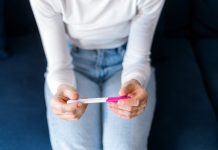There is little mainstream awareness of the condition that impacts one in ten women – currently, 30% of people with Polycystic ovary syndrome (PCOS) rely on online forums for information
PCOS means that a person is often unable to release an egg from their polycystic ovaries, leading to irregular periods and ovulation. Other common features of PCOS are excess ‘male’ hormones in the body, which can cause excess hair growth.
One in ten women have PCOS, but only half of them experience symptoms. Often, the first moment of realisation can come from attempting to have a baby or a persistent depression during teenage years.
What are the symptoms of PCOS?
- Irregular periods or no periods at all
- Difficulty getting pregnant as a result of irregular ovulation or failure to ovulate
- Excessive hair growth (hirsutism) – usually on the face, chest, back or buttocks
- Weight gain
- Thinning hair and hair loss from the head
- Oily skin or acne
- Depression and mood swings
Infertility is still a ‘taboo’ subject
According to the 2021 Fertility Journey study, there is a strong need for more general education about PCOS. This study examined 395 women with PCOS.
The survey found that perceptions of infertility as a ‘taboo’ subject also haunted individuals who live with PCOS.
This undercurrent of fear even exists in rumours about the COVID vaccine, which suggest that the vaccine could make women purposefully infertile. Though this rumour has been disproven, it remains in public discussion about vaccine side effects like a ghost.
Due to a combination of stigmas, from fertility as a confirmation of womanhood to lack of education about the condition, people seek information from online forums. For 30% of people, online communities and Google are the way to learn about their condition.
The potential for PCOS misinformation
While 30% of people with PCOS chose to look to online forums for guidance, overall 54% chose not to go a healthcare professional to discuss their PCOS.
A further 20% follow the guidance of Instagram influencers, while another 18% look to Facebook groups for insight.
This raises a severe lack of faith in how existing primary care services handle female health and infertility. In recent years, women have been forced to become amateur medical researchers to understand the risks of hormonal contraceptives. The NHS is highly stretched, with the COVID pandemic hitting doctors with a flurry of crises to navigate. There is a general reluctance in the public to engage the services of the NHS due to awareness of stretched resources – but this decision risks worse health problems in the future.
Women appear to be consistently hesitant about seeking primary care for PCOS – until they attempt to give birth. The survey found that 58% of people realise they have PCOS and then engage the help of a fertility clinic. A further 7% of people believe they have PCOS, but don’t have an official diagnosis.
While PCOS is described in physical terms, it has significant mental health consequences too. According to Fertility Family, 40% of teenage girls with PCOS had depression – directly related to their condition.
PCOS can further lead to type 2 diabetes, depression, high blood pressure, high cholesterol, heart disease and strokes later on in life if undiagnosed and misunderstood.












I would like to add that managing PCOS is possible but one can never get rid of it.